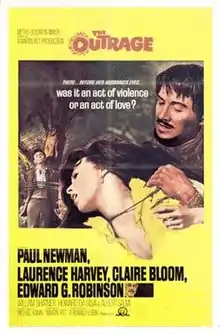| The Outrage | |
|---|---|
 Theatrical release poster | |
| Directed by | Martin Ritt |
| Screenplay by | Michael Kanin |
| Based on | "In a Grove" and "Rashomon" by Ryūnosuke Akutagawa Rashomon by Akira Kurosawa Shinobu Hashimoto Rashomon (play) by Fay Kanin Michael Kanin |
| Produced by | A. Ronald Lubin |
| Starring | |
| Cinematography | James Wong Howe |
| Edited by | Frank Santillo |
| Music by | Alex North |
| Color process | Black and white |
Production company | Martin Ritt Productions |
| Distributed by | Metro-Goldwyn-Mayer |
Release date |
|
Running time | 96 minutes |
| Country | United States |
| Language | English |
| Budget | $3 million[1] |
| Box office | $1,800,000 (US/ Canada rentals)[2] |
The Outrage is a 1964 American Western film directed by Martin Ritt and starring Paul Newman, Laurence Harvey, Claire Bloom, Edward G. Robinson and William Shatner.[3] It is a remake of Akira Kurosawa's 1950 Japanese film Rashomon, based on stories by Ryūnosuke Akutagawa. Like Kurosawa's film, four people give contradictory accounts of a rape and murder. Ritt utilizes flashbacks to provide these contradictory accounts.[4]
Plot
Three disparate travelers — a disillusioned preacher, an unsuccessful prospector, and a larcenous, cynical con man — meet at a decrepit railroad station in the 1870s Southwest United States. The prospector and the preacher were witnesses at the rape and murder trial of the notorious bandit Juan Carrasco. The bandit duped an aristocratic Southerner, Colonel Wakefield, into believing he knew the location of a lost Aztec treasure. While the greedy "gentleman" was bound to a tree and gagged, Carrasco assaulted his wife Nina. These events lead to the stabbing of the husband. Carrasco was tried, convicted, and condemned for the crimes.
Everyone's account on the witness stand differed dramatically. Carrasco claimed that Wakefield was tied up with ropes while Nina was assaulted, after which he killed the colonel in a duel. The newlywed wife contends that she was the one who killed her husband because he accused her of leading on Carrasco and causing the rape. The dead man "testifies" through a third witness, an old Indian shaman, who said that neither of those accounts was true. The shaman insists that the colonel used a jeweled dagger to commit suicide after the incident.
There was a fourth witness, the prospector, one with a completely new view of what actually took place. But can his version be trusted?
Cast
- Paul Newman as Juan Carrasco
- Laurence Harvey as Colonel Wakefield
- Claire Bloom as Nina Wakefield
- Edward G. Robinson as Con Man
- William Shatner as Preacher
- Howard Da Silva as Prospector
- Albert Salmi as Sheriff
- Thomas Chalmers as Judge
- Paul Fix as Indian
Home media
The Outrage was released to DVD by Warner Home Video on February 17, 2009 in a Region 1 widescreen DVD.
See also
- List of American films of 1964
- The Outrage, 2011 film
References
- ↑ "AFI|Catalog".
- ↑ This figure consists of anticipated rentals accruing distributors in North America. See "Top Grossers of 1965", Variety, 5 January 1966 p 36
- ↑ Field, Sydney (April 1, 1965). "Outrage". Film Quarterly. 18 (3): 13–39. doi:10.2307/1210961. ISSN 0015-1386. JSTOR 1210961.
- ↑ Miller, Gabriel (2000). The Films of Martin Ritt: Fanfare for the Common Man. Jackson, MS: University Press of Mississippi. p. 70. ISBN 9781617034961. Retrieved February 22, 2013.